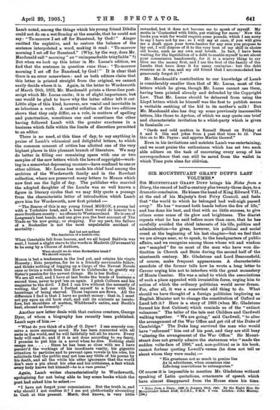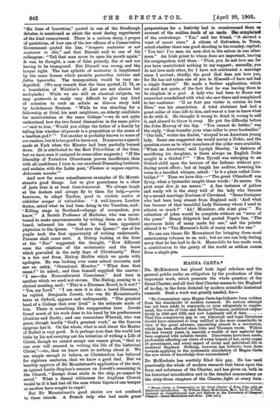SIR MOITNTSTUART GRANT DUFF'S LAST VOLUMES.*
SIR MOUNTSTUART GRANT DUFF brings his Notes from CI Diary, the record of half-a-century plus twenty-three days, to a dramatic conclusion. He kisses the hand of King Edward VII., at the end of his Majesty's first Privy Council, and feels that "the world to which he belonged had well-nigh passed away." He has "warmed both hands before the fire of life," and has done his best, and that with no little success, to give others some sense of its glow and brightness. The diarist repeats what he has said before more than once, that he has carefully avoided the chief interests of his life, politics and administration—he gives, however, his political and social creed at the beginning of his last chapter—but we feel that we are always near, so to speak, to the headquarters of public affairs, and we recognise among those whose wit and wisdom are "sampled" for us most of the men who have won dis- tinction in Church and State during the second half of the nineteenth century. Mr. Gladstone and Lord Beaconsfield, of course, make frequent appearances. A characteristic anecdote of the former tells how he wrote a long letter to Cavour urging him not to interfere with the great monastery of Monte Casein°. His was a mind to which the associations of such a place appealed with irresistible force, urging him to action of which the ordinary politician would never dream. For, after all, it was a somewhat odd thing to do. What should we have thought of a foreign politician imploring an English Minister not to change the constitution of Orford as Laud left it ? Here is a story of 1868 (when Mr. Gladstone formed his first Cabinet) which reminds us of the "extinct volcanoes." The teller of the tale met Childers and Cardwell walking together. "We are going," said Cardwell, "to alter the arrangement of the War Office and get rid of the Duke of Cambridge." The Duke long survived the man who would have "reformed" him out of his post, and they are still busy "altering the arrangement of the War Office." Sir Mount- stuart does not greatly admire the statesman who "made the sudden volts-face of 1886," and, non-political as is his book, cannot forbear quoting Lowell's verses (he does not tell us about whom they were made) :— " His greatness not so much in genius lies As in adroitness, when occasions rise Life-long convictions to extemporise."
Of course it is impossible to mention Mr. Gladstone without speaking of Latin quotations, ornaments of speech which have almost disappeared from the House since his time.
• Notes front a Diary, 1890 to January 23rd, 1901. By the Right Hon. Sir Hountstuart Grant Duff, G.C.S.I., F.H.B. 2 vols. London : John Murray.
"Six lines of Lucretius," quoted in one of the Bradlaugh debates, is mentioned as about the most daring experiment
of the kind remembered. There is a curious story, a propos
of quotations, of bow one of the law officers of a Conservative Government quoted the line, "tempera mutantur et nos mutamur in illis," and that Disraeli said to one of his colleagues : "Tell that man never to open his mouth again." It was, he thought, a case of false prosody, the et and nos having to be transposed. But Disraeli was wrong, and the lawyer right. The last syllable of mutantur is lengthened by the same license which permits pectoribus inhians and flatus hyacintho. The transposition would be very un- dignified. (We may remark that the lines quoted, II. 91, as a translation of Whittier's At Last are not alcaics but asclepiads.) While we are still on classical subjects, we may quote—it is really very difficult to give any kind of cohesion to such an article as this—a story told by Archdeacon Denison. "While he was standing for a fellowship at Oriel, his next neighbour, an elderly candidate for matriculation at the same College "—we do not quite understand how the two found themselves in the same garere —"said to him, Would you oblige the father of a family by telling him whether aliquando is a preposition or the name of a heathen god ? ' " Yet another is probably known to some of our readers, but it is too good to leave out. It concerns a speech made at York when the Minster had been partially burned down. (It is attributed to the Earl Fitzwilliam of the time, but we have seen it assigned to some other magnate.) "If the liberality of Yorkshire Churchmen proves insufficient, then with all confidence I turn to our excellent Dissenting brethren and exclaim with the Latin poet, 'Flectere si nequeo superos, Acheronta movebo.'"
And now for some miscellaneous examples of Sir Mount- stuart's good things. Let us give precedence to a class of jests that is at least time-honoured. We always laugh at the doctors and always fly to them for help,—genus hominum, to adapt Tacitus, quod in eivitate nostra et ridebitur semper et retinebitur. "A well-known London doctor, asked what he had been doing in the Vacation, said : Killing stags in Scotland—change of occupation, you know.' " A Scotch Professor of Medicine, who was accus- tomed to make announcements by writing them on a black- board, informed his class that he had been appointed physician to the Queen. "God save the Queen !" one of his pupils took the first opportunity of writing underneath. Parsons shall come next. A Bishop looking at the lions at the " Zoo " suggested the thought, "How different were the relations of the ecclesiastic and the beast which prevailed in the early days of Christianity." Here is a bon snot from Bishop Stubbs which we quote with apologies. He was looking over some school accounts, and saw an entry, "Occasional Monitor." "What does that mean ? " he asked ; and then himself supplied the answer : "1 see—the Nonconformist Conscience." And here is another which we need not excuse. The Bishop, coming to a clerical meeting, said : "This is a Diocesan Board, is it not P" "Yes, my Lord." "I am sure it is also a bored Diocesan," he replied. Benjamin Jowett, who was Sir Mountstuart's tutor at Oxford, appears not unfrequently. "The greatest head of a College that ever lived" is the estimate made of him. There is something like exaggeration here. Jowett found much of his work done to his hand by his predecessors (Jenkins and Scott) ; and one remembers Whewell, who was great, though hardly "God's greatest work," as the famous epigram has it. On the whole, what is said about the Master of Balliol is very good. It is perhaps true that the world lost little by his not carrying out his intention of writing a Life of Christ, though we cannot accept one reason given, "that no one ever will succeed in writing the life of the historical Christ,"—viz., that we know next to nothing about it. We are simple enough to believe, as Christendom has believed for eighteen centuries, that we know a good deal. But we heartily approve of Sir Mountstuart's application of the text, as against Leslie Stephen's censure on Jowett's remaining in the Church, "Except these abide in the ship, ye cannot be saved." What a dismal wilderness the Anglican Church would be if it had lost all the men whom bigots of one temper or another have sought to expel !
But Sir Mountstuart's good stories are not confined to these islands. A French lady who had made great
preparations for a festivity had to countermand them an account of the sudden death of an uncle. She complained
of the contretemps. "Yes," said her friend, "it showed a want of savoir vivre." A citizen of Galveston, in Texas, asked whether there was good shooting in his country, replied: "You bet ! I've seen six men shot in the saloon in one after- noon." An Irish priest to whom dues are important, leaving his congregation, told them : "First, you do not love me, for you have contributed nothing to my support ; secondly, you do not love each other, for I have not celebrated a marriage since I arrived ; thirdly, the good God does not love you, for He has not taken one of you to Himself—I have not had a single funeral." He made a further application, which we shall not quote, of the fact that he was leaving them to be chaplain in a gaol. A lady who had been to Rome was somewhat scandalised with what she saw there and complained to her confessor. "Ii ne taut pas visiter la cuisine du bon Dien," was his consolation. A total abstainer had had a great cellar of wine left to him, and was at a loss to know what to do with it. He thought it wrong to drink it, wrong to sell it, and absurd to throw it away. He put the difficulty before the John Murray of the day. "You cannot do better," was the reply, "than transfer your wine cellar to your bookseller." "Our talk," writes the diarist, "strayed to an American young lady. Some one suggested she would marry a Duke; and the question arose as to what members of the order were available. When an American,' said Lyulph Stanley, is desirous of sacrificing his daughter, is there always an English Duke caught in a thicket ?' " " Mrs. Tyrrell was enlarging to an Oxford child upon the horrors of the Inferno without pro- ducing much effect ; but at length her auditor, lowering his voice to a terrified whisper, asked : Is it a place called Cam- bridge ? ' " Then we have this :—" The great 011endorff was dying, when a bystander caught these words :'Jo meurs. On pent aussi dire je me meurs.' " A fine instance of pathos and ready wit is the story told of the lady who became by a second marriage Duchess of Cleveland. "Some foreigner who had been long absent from England said: And what has become of that beautiful Lady Dalmeny whom I used to admire so much ?" ! Monsieur, elle n'est plus.'" No collection of jokes would be complete without an "error of the press." Henry Sidgwick had quoted Pope's line, "The enormous faith of many made for one," and the printer altered it to "The Mormon's faith of many made for one."
No one can blame Sir Mounstuart for bringing these most entertaining volumes to an end ; but no one can help feeling sorry that he has had to do it. Meanwhile he has made such a contribution to the gaiety of the world as seldom comes from a single pen.



















































 Previous page
Previous page